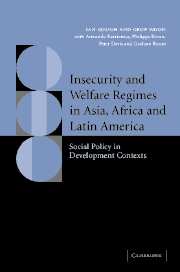 Insecurity and Welfare Regimes in Asia, Africa and Latin America
Insecurity and Welfare Regimes in Asia, Africa and Latin America Book contents
- Frontmatter
- Contents
- List of maps
- List of figures
- List of tables
- List of authors
- Acknowledgements
- List of abbreviations
- Glossary
- Introduction
- Part I Understanding insecurity and welfare regimes in the South: an analytical framework
- Part II Regional regimes
- Part III Regimes in global context
- Conclusion : Rethinking social policy in development contexts
- References
- Index
Introduction
Published online by Cambridge University Press: 04 August 2010
- Frontmatter
- Contents
- List of maps
- List of figures
- List of tables
- List of authors
- Acknowledgements
- List of abbreviations
- Glossary
- Introduction
- Part I Understanding insecurity and welfare regimes in the South: an analytical framework
- Part II Regional regimes
- Part III Regimes in global context
- Conclusion : Rethinking social policy in development contexts
- References
- Index
Summary
The improvement of human welfare is now an explicit goal of international development discourse and policy. The Millennium Development Goals commit the UN and other international agencies to: reduce the proportion of people living in extreme poverty by half between 1990 and 2015; to enrol all children in primary school by 2015; to eliminate gender disparities in primary and secondary education by 2005; to reduce infant and child mortality rates by two-thirds and maternal mortality rates by three-quarters between 1990 and 2015; and to provide access for all who need reproductive health services by 2015. These are bold targets, and represent a fundamental shift in global discourse.
The reality is more prosaic and, in many zones of the world, tragic. Few of these targets are on track to be met at the present time. Global inequality has mushroomed to ‘grotesque levels’ according to the UNDP (2002), thereby increasing the threats to everyone's welfare, even the more wealthy. In parts of Africa especially, HIV/AIDS, famine and war generate intolerable levels of human suffering. In more successful parts of the developing world, rapid capitalist development, which has contributed to the erosion of absolute poverty, has simultaneously heightened insecurity and vulnerability. New risks, threats and uncertainty challenge subjective and objective well-being. This is not to claim that managed development and growth cannot improve human welfare – they clearly can and have done so in much of East Asia, for example – but it is to recognise the new hazards of insecurity and new challenges to well-being, alongside pre-existing ones, in what is essentially still an unregulated international politico-economic system.
- Type
- Chapter
- Information
- Insecurity and Welfare Regimes in Asia, Africa and Latin AmericaSocial Policy in Development Contexts, pp. 1 - 12Publisher: Cambridge University PressPrint publication year: 2004
- 10
- Cited by


